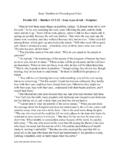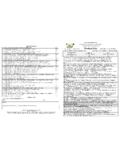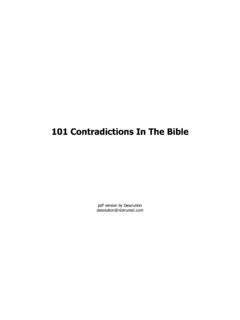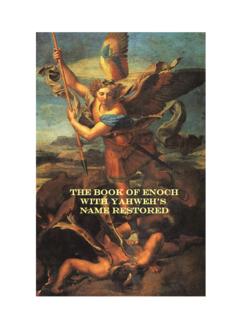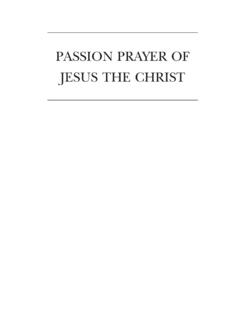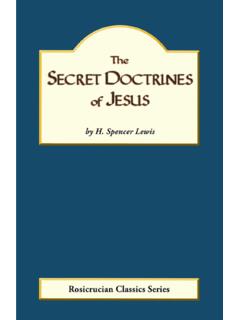Transcription of The Complete Book of Enoch: Standard English Version
1 THE COMPLETEBOOK OF ENOCHS tandard English VersionDr. Jay WinterCopyright 2015 by Dr. Jay WinterWinter PublicationsSome rights reserved. This book may be reproduced in any fashion with theexpress condition that it remains distributed free of charge. This manuscript is toremain free and be accessible to the public domain. Translated from the original Ethiopic manuscript and logically of Congress Cataloging-in-Publication DataWinter, Complete Book of Enoch: Standard Version / by Dr. Jay Winter --p. History ScriptureseBook CoverTitle PageCopyrightTable of ContentsIntroduction - About the Book of EnochTHE BOOK OF ENOCHBook 1 - Watchers - Ch. 1 - Blessing of EnochBook 1 - Watchers - Ch. 2 - The CreationBook 1 - Watchers - Ch. 3 - The Fallen AngelsBook 1 - Watchers - Ch. 4 - Intercession of AngelsBook 1 - Watchers - Ch.
2 5 - Book of the Words of RighteousnessBook 1 - Watchers - Ch. 6 - Taken by AngelsBook 1 - Watchers - Ch. 7 - The Holy AngelsBook 2 - parables - Ch. 1 - The First ParableBook 2 - parables - Ch. 2 - The Second ParableBook 2 - parables - Ch. 3 - The Third ParableBook 3 - Book of Noah - Ch. 1 - Birth of NoahBook 3 - Book of Noah - Ch. 2 - Calling EnochBook 3 - Book of Noah - Ch. 3 - Judgement of AngelsBook 3 - Book of Noah - Ch. 4 - secrets of the ParablesBook 4 - Kingdom of Heaven - Ch. 1 - Enoch is TakenBook 4 - Kingdom of Heaven - Ch. 2 - The Luminaries of HeavenBook 4 - Kingdom of Heaven - Ch. 3 - Heavenly TabletsBook 4 - Kingdom of Heaven - Ch. 4 - One Year to RecordBook 4 - Kingdom of Heaven - Ch. 5 - VisionsBook 5 - Epistle of Enoch - Ch. 1 - Guidance of EnochBook 5 - Epistle of Enoch - Ch. 2 - Wisdom of EnochBook 5 - Epistle of Enoch - Ch.
3 3 - Wisdom of EnochBook 5 - Epistle of Enoch - Ch. 4 - Wisdom of EnochBook 5 - Epistle of Enoch - Ch. 5 - Wisdom of EnochBook 5 - Epistle of Enoch - Ch. 6 - Revelation of EnochEXTRASDead Sea Scroll ChartBook of the GiantsEvidence of GiantsTestament of SolomonReferences to Enoch in Other ManuscriptsAbout the Book of Enoch (Also known as "Ethiopian Enoch") The Book of Enoch (also known as 1 Enoch) was once cherished by Jews andChristians alike, this book later fell into disfavor with powerful theologians -precisely because of its controversial statements on the nature and deeds of thefallen Enochian writings, in addition to many other writings that were excluded (orlost) from the Bible ( , the Book of Tobit, Esdras, etc.) were widely recognizedby many of the early church fathers as "Apocryphal" writings.
4 The term"apocrypha" is derived from the Greek word meaning "hidden" or "secret".Originally, the import of the term may have been complimentary in that the termwas applied to sacred books whose contents were too exalted to be madeavailable to the general Dan. 12:9-10 we hear of words that are shut up until the end of time and,words that the wise shall understand and the wicked shall not. In addition, 4 Ezra14:44ff. mentions 94 books, of which 24 (the OT) were to be published and 70were to be delivered only to the wise among the people. Gradually, the term"apocrypha" took on a pejorative connotation, for the orthodoxy of these hiddenbooks was often questionable. Origen (Comm. in Matt. ; p. )distinguished between books that were to be read in public worship andapocryphal books.
5 Because these secret books were often preserved for usewithin the esoteric circles of the divinely - knit believers, many of the critically -spirited or "unenlightened" Church Fathers found themselves outside the realmof understanding, and therefore came to apply the term "apocryphal" to, whatthey claimed to be, heretical works which were forbidden to be Protestant parlance, "the Apocrypha" designate 15 works, all but one of whichare Jewish in origin and found in the Septuagint (parts of 2 Esdras are Christianand Latin in origin). Although some of them were composed in Palestine inAramaic or Hebrew, they were not accepted into the Jewish canon formed late inthe 2nd century AD (Canonicity, 67:31-35). The Reformers, influenced by theJewish canon of the Old Testament, did not consider these books on a par withthe rest of the Scriptures; thus the custom arose of making the Apocrypha aseparate section in the Protestant Bible, or sometimes even of omitting thementirely (Canonicity, 67:44-46).
6 The Catholic view, expressed as a doctrine offaith at the Council of Trent, is that 12 of these 15 works (in a differentenumeration, however) are canonical Scripture; they are called theDeuterocanonical Books (Canonicity, 67:21, 42-43).The three books of the Protestant Apocrypha that are not accepted by Catholicsare 1-2 Esdras and the Prayer of Manasseh. The theme of the Book of Enochdealing with the nature and deeds of the fallen angels so infuriated the laterChurch fathers that one, Filastrius, actually condemned it openly as heresy(Filastrius, Liber de Haeresibus, no. 108). Nor did the rabbis deign to givecredence to the book's teaching about angels. Rabbi Simeon ben Jochai in thesecond century pronounced a curse upon those who believed it (Delitzsch,p.)
7 223). So the book was denounced, banned, cursed, no doubt burned andshredded - and last but not least, lost (and conveniently forgotten) for a thousandyears. But with an uncanny persistence, the Book of Enoch found its way backinto circulation two centuries 1773, rumors of a surviving copy of the book drew Scottish explorer JamesBruce to distant Ethiopia. True to hearsay, the Book of Enoch had beenpreserved by the Ethiopic church, which put it right alongside the other books ofthe Bible. Bruce secured not one, but three Ethiopic copies of the book andbrought them back to Europe and Britain. When in 1821 Dr. Richard Laurence, aHebrew professor at Oxford, produced the first English translation of the work,the modern world gained its first glimpse of the forbidden mysteries of scholars say that the present form of the story in the Book of Enoch waspenned sometime during the second century and was popular for at leastfive hundred years.
8 The earliest Ethiopic text was apparently made from a Greekmanuscript of the Book of Enoch, which itself was a copy of an earlier text. Theoriginal was apparently written in Semitic language, now thought to be it was once believed to be post-Christian (the similarities to Christianterminology and teaching are striking), recent discoveries of copies of the bookamong the Dead Sea Scrolls found at Qumran prove that the book was inexistence before the time of Jesus Christ. But the date of the original writingupon which the second century Qumran copies were based is shrouded inobscurity. It is, in a word, old. It has been largely the opinion of historians thatthe book does not really contain the authentic words of the ancient biblicalpatriarch Enoch, since he would have lived (based on the chronologies in theBook of Genesis) several thousand years earlier than the first known appearanceof the book attributed to him.
9 Although in the book he commands his sonMethuselah to preserve the book unto future generations, which in itself is a callto copy the books he wrote so they might not be lost to the its unknown origins, Christians once accepted the words of this Book ofEnoch as authentic scripture, especially the part about the fallen angels and theirprophesied judgment. In fact, many of the key concepts used by Jesus Christhimself seem directly connected to terms and ideas in the Book of Enoch. Thus,it is hard to avoid the conclusion that Jesus had not only studied the book, butalso respected it highly enough to adopt and elaborate on its specific descriptionsof the coming kingdom and its theme of inevitable judgment descending upon"the wicked" - the term most often used in the Old Testament to describe is abundant proof that Christ approved of the Book of Enoch.
10 Over ahundred phrases in the New Testament find precedents in the Book of remarkable bit of evidence for the early Christians' acceptance of theBook of Enoch was for many years buried under the King James Bible'smistranslation of Luke 9:35, describing the transfiguration of Christ: "And therecame a voice out of the cloud, saying, 'This is my beloved Son: hear him."Apparently the translator here wished to make this verse agree with a similarverse in Matthew and Mark. But Luke's verse in the original Greek reads: "Thisis my Son, the Elect One (from the Greek ho eklelegmenos, lit., "the elect one"):hear him." The "Elect One" is a most significant term (found fourteen times) inthe Book of Enoch. If the book was indeed known to the apostles of Christ, withits abundant descriptions of the Elect One who should "sit upon the throne ofglory" and the Elect One who should "dwell in the midst of them," then the greatscriptural authenticity is accorded to the Book of Enoch when the "voice out ofthe cloud" tells the apostles, "This is my Son, the Elect One" - the one promisedin the Book of Book of Jude tells us in verse 14 that "Enoch, the seventh from Adam, " Jude also, in verse 15, makes a direct reference to the Book ofEnoch (2:1), where he writes, "to execute judgment on all, to convict all who " The time difference between Enoch and Jude is approximately 3400years.

